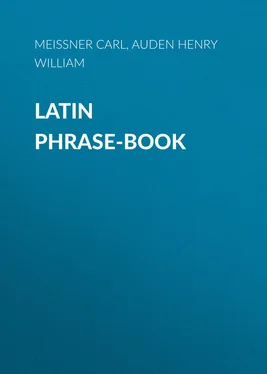Carl Meissner - Latin Phrase-Book
Здесь есть возможность читать онлайн «Carl Meissner - Latin Phrase-Book» — ознакомительный отрывок электронной книги совершенно бесплатно, а после прочтения отрывка купить полную версию. В некоторых случаях можно слушать аудио, скачать через торрент в формате fb2 и присутствует краткое содержание. Жанр: foreign_antique, foreign_prose, на латинском языке. Описание произведения, (предисловие) а так же отзывы посетителей доступны на портале библиотеки ЛибКат.
- Название:Latin Phrase-Book
- Автор:
- Жанр:
- Год:неизвестен
- ISBN:нет данных
- Рейтинг книги:5 / 5. Голосов: 1
-
Избранное:Добавить в избранное
- Отзывы:
-
Ваша оценка:
- 100
- 1
- 2
- 3
- 4
- 5
Latin Phrase-Book: краткое содержание, описание и аннотация
Предлагаем к чтению аннотацию, описание, краткое содержание или предисловие (зависит от того, что написал сам автор книги «Latin Phrase-Book»). Если вы не нашли необходимую информацию о книге — напишите в комментариях, мы постараемся отыскать её.
Latin Phrase-Book — читать онлайн ознакомительный отрывок
Ниже представлен текст книги, разбитый по страницам. Система сохранения места последней прочитанной страницы, позволяет с удобством читать онлайн бесплатно книгу «Latin Phrase-Book», без необходимости каждый раз заново искать на чём Вы остановились. Поставьте закладку, и сможете в любой момент перейти на страницу, на которой закончили чтение.
Интервал:
Закладка:
accessus et recessus aestuum – ebb and flow (of tide).
decessus aestus – the ebb.
aestus maritimi mutuo accedentes et recedentes (N. D. 2. 53. 132) – the alternation of tides.
aestus ex alto se incitat (B. G. 3.12) – the tide is coming in.
aestu rursus minuente – when the tide begins to go down.
mare ventorum vi agitatur et turbatur – there is a storm at sea.
mare medium or internum 9 9 The Romans called it mare nostrum (B.G. 5.1). Similarly mare Oceanus (B. G. 3. 7), the Atlantic; mare superum , the Adriatic (Att. 8. 16. 1); mare inferum , the Etruscan Sea (Att. 8. 3. 5).
– the Mediterranean Sea.
4. Fire
ignem facere, accendere – to light, make a fire.
ignem tectis inferre, subicere – to set fire to houses.
ignem concipere, comprehendere – to take fire.
ignem excitare (pro Mur. 25. 51) – to make up, stir up a fire.
ignem alere – to keep up a fire.
accendere, incendere aedificia – to set buildings on fire.
inflammare urbem – to set fire to a city.
flammis corripi – to be devoured by the flames.
incendio flagrare , or simply conflagrare, ardere (Liv. 30. 7) – to be on fire, in flames.
incendio deleri, absūmi – to be burned to ashes.
igni cremari, necari – to perish in the flames.
ignem conclamare – to raise an alarm of fire.
ventus ignem distulit (B. G. 5. 43) – the wind spread the conflagration.
5. Air – Sky – Climate – Heavenly Bodies
aer terrae circumiectus or circumfusus – the atmosphere.
aer qui est terrae proximus – the atmosphere.
suspicere 10 10 suspicere is also used figuratively, to look up to, esteem, honour, e.g. viros, honores . Similarly despicere .
(in) caelum – to raise the eyes to heaven; to look up to the sky.
oculos tollere, attollere ad caelum – to raise the eyes to heaven; to look up to the sky.
sub divo – in the open air.
orbis finiens (Div. 2. 44. 92) – the horizon.
caelum or natura caeli – climate.
caelum salūbre, salubritas caeli (opp. grave, gravitas ) – healthy climate.
caeli temperatio – temperate climate.
aer calore et frigore temperatus – temperate climate.
caeli asperitas – rough climate.
caeli varietas – variable climate.
caelestia – (1) the heavenly bodies, (2) celestial phenomena.
sol oritur, occidit – the sun rises, sets.
ortus, occasus solis – sunrise; sunset.
sol 11 11 For an account of an eclipse vid. Liv. 44. 37.
( luna ) deficit, obscuratur – the sun, moon, is eclipsed.
solis defectio – an eclipse of the sun.
luna crescit; decrescit, senescit – the moon waxes, wanes.
motus stellarum constantes et rati – the regular courses of the stars.
cursum conficere in caelo – to run its course in the sky.
caelum astris distinctum et ornatum – the star-lit sky; the firmament.
nox sideribus illustris – a star-light night.
stellae errantes, vagae – the planets.
stellae inerrantes (N. D. 2. 21. 54) – the fixed stars.
sidera certis locis infixa – the fixed stars.
orbis lacteus – the milky way.
orbis signifer – the zodiac.
vertex caeli, axis caeli, cardo caeli – the pole.
orbis, pars (terrae), cingulus – a zone.
orbis medius – the temperate zone.
6. Natural Phenomena
vocis imago , or simply imago 12 12 Also metaphorically, e.g. gloria virtuti resonat tamquam imago (Tusc. 3. 3), glory is as it were the echo of virtue.
– an echo.
saxa voci respondent or resonant – the rocks re-echo.
ventus remittit (opp. increbrescit ) – the wind is falling.
ventus cadit, cessat – the wind dies down, ceases.
ventis secundis, adversis uti – to have favourable, contrary, winds.
ventus se vertit in Africum – the wind is turning to the south-west.
tempestas cooritur – a storm is rising.
imber tenet (Liv. 23. 44. 6) – the rain continues.
imbres repente effusi – a sudden shower.
tempestatem idoneam, bonam nancisci – to meet with good weather.
calor se frangit (opp. increscit ) – the heat is abating.
sol ardet, urit – the sun burns, scorches.
ardore solis torreri – to be dried up by the sun's heat.
tanta vis frigoris insecuta est, ut – the frost set in so severely that…
frigore (gelu) rigere, torpere – to be numb with cold.
frigore confici – to freeze to death.
aestus et frigoris patientem esse – to be able to bear heat and cold.
tempestas cum magno fragore (caeli) tonitribusque (Liv. 1. 16) – a storm accompanied by heavy claps of thunder.
caelum tonitru contremit – the heavens are shaken by the thunder.
fulmina 13 13 Used sometimes figuratively, e.g. fulmen verborum, fulmina eloquentiae, fulmina fortunae (Tusc. 2. 27), fulmina imperii (Balb. 15. 34).
micant – the lightning flashes.
fulmen locum tetigit – the lightning has struck somewhere.
fulmine tangi, ici – to be struck by lightning.
de caelo tangi, percuti – to be struck by lightning.
fulmine ictus – struck by lightning.
eruptiones ignium Aetnaeorum – an eruption of Etna.
Vesuvius evomit (more strongly eructat ) ignes – Vesuvius is discharging flame.
venti ab ortu solis flant – the east winds are blowing.
II. Space and Time
1. Points of the Compass – Situation
spectare in (vergere ad) orientem (solem), occidentem 14 14 "The east" and "the west" = orientis, occidentis (solis) terrae, partes, regiones, gentes . The adjectives orientalis, occidentalis are not used in good Latin. The north, i.e. northern countries, is represented by terrae septentrionibus subiectae ; the south by terra australis .
( solem ), ad meridiem, in septentriones – to lie to the east, west, south, north.
spectare inter occasum solis et septentriones – to be situate to the north-west.
Germania quae or Germaniae ea pars quae, ad orientem, occidentem vergit – eastern, western Germany.
est a septentrionibus collis – a hill lies to the north.
situs loci – the situation of a place.
natura loci – the natural position of a place.
opportunitas loci (B. G. 3. 14) – the advantageous situation of a place.
opportuno loco situm or positum esse – to be favourably situated.
urbs situ ad aspectum praeclara est – the city is very beautifully situated.
oppidum mari adiacet – the town lies near the sea.
villa tangit viam – the country-house stands near the road.
oppidum colli impositum est – the town stands on rising ground.
Читать дальшеИнтервал:
Закладка:
Похожие книги на «Latin Phrase-Book»
Представляем Вашему вниманию похожие книги на «Latin Phrase-Book» списком для выбора. Мы отобрали схожую по названию и смыслу литературу в надежде предоставить читателям больше вариантов отыскать новые, интересные, ещё непрочитанные произведения.
Обсуждение, отзывы о книге «Latin Phrase-Book» и просто собственные мнения читателей. Оставьте ваши комментарии, напишите, что Вы думаете о произведении, его смысле или главных героях. Укажите что конкретно понравилось, а что нет, и почему Вы так считаете.

![Рис Хьюз - Madonna Park[e-book - рассказы]](/books/94285/ris-hyuz-madonna-park-e-book-rasskazy-thumb.webp)










